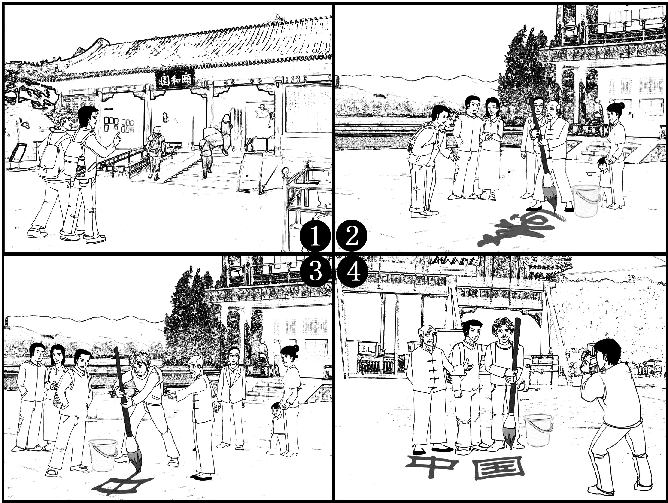题目内容
12.假设你是红星中学高三学生李华.请根据以下四幅图的先后顺序,给校刊"英语园地"写一篇短文,介绍上周你与外国朋友Tom 在颐和园的经历.注意:词数不少于60.
提示词:毛笔a writing brush

分析 高分句型一:
Last weekend,Tom and I paid a visit to the Summer Palace,which proved to be very interesting and rewarding.上周,Tom和我一起去参观了颐和园,这次游玩是非常有趣且值得的.
高分句型二:
The moment we entered the park,Tom was attracted by the beautiful scenery and we walked along the beautiful lake happily. 我们一进入到公园,Tom就被漂亮的景色所吸引,然后我们就快乐的沿着漂亮的湖散步.
句型一 which proved to be very interesting and rewarding.该句为which作引导词,在从句中充当主语,且替代前面出现的整个句子的非限制性定语从句
句型二 The moment we entered the park…该句是一个由the moment引导的时间状语从句,意为:一…就…
此外还有以下短语和句型:
pay a visit to couldn't help but do sth to one's suprise in addition
解答 Last weekend,Tom and I paid a visit to the Summer Palace,which proved to be very interesting and rewarding.(高分句型一)
We arrived at the entrance early in the morning and I introduced the history of the park to Tom briefly.The moment we entered the park,Tom was attracted by the beautiful scenery and we walked along the beautiful lake happily.(高分句型二)Soon,we noticed an elderly man practicing calligraphy on the ground,with a bucket of water aside.Holding a big writing brush in his hand,he wrote the Chinese character for"longevity".As well as other tourists,we couldn't help but admire his skills.
To our surprise,the elderly man invited Tom to have a try.With his help,Tom completed his first calligraphy task,the two Chinese characters for"China",quite successfully.Before we left,we took a photo together to memorize this valuable experience.In the picture,Tom held the writing brush and the elderly man smiled,with his thumb up.
I was so glad that I could help my foreign friend to learn about the art of the language we have been using for several thousand years.In addition,I rediscovered the charm of Chinese culture.
点评 本书面表达主要为看图写作,此类作文对考生的细心程度和观察力有一定的要求,写作时一定要密切联系图片所表达的内容,结合所给文字提示,将图片内容阐述清楚.此类作文要求考生适当发散思维,但表达应符合逻辑.

| A. | which | B. | where | C. | whose | D. | when |
-______!I'm sure you can make it.( )
| A. | Good luck | B. | Cheer up | C. | Best wishes | D. | Doesn't matter |
Recent research has illustrated that deep reading,characterized as a unique experience different kind from the mere understanding of words,is slow,immersive (沉浸的),rich in sensory detail and emotional and moral complexity.Although deep reading does not,strictly speaking,require a conventional book,the limits of the printed page are uniquely helpful to the deep reading experience.A book's lack of hyperlinks (超链接),for example,frees the reader from making decisions-should I click on this link or not-allowing her to remain fully absorbed in the story.
That immersion is supported by the way the brain handles language rich in detail,indirect reference and figures of speech:by creating a mental representation that draws on the same brain regions that would be active if the scene were unfolding in real life.The emotional situations and moral dilemmas that are the material of literature are also vigorous (有活力的) exercise for the brain,driving us inside the heads of fictional characters and even,studies suggest,increasing our real-life capacity (能力) for recognition.
None of this is likely to happen when we're browsing through a website.Although we call the activity by the same name,the deep reading of books and the information-driven reading we do on the Web are very different,both in the experience they produce and in the capacity they develop.A growing body of evidence suggests that online reading may be less satisfying,even for the"digital natives"to whom it is so familiar.Researchers reported that 39% of children and teens read daily using electronic devices,but only 28% read printe d materials every day.Those who only read onscreen were three times less likely to say they enjoy reading very much and tell which book they like best.The study also found that young people who read daily only onscreen were nearly twice less likely to be above-average readers than those who read daily in print or both in print and onscreen.
All in all,the disappearance of deep reading would harm the intellectual and emotional development of generations growing up online,as well as the preservation of a critical part of our culture:the novels,poems and other kinds of literature that can be appreciated only by readers whose brains have been trained to understand them.
| Passage outline | Supporting details |
| The present situation about deep reading | ◆As we are reading more on the Web,deep reading has a tendency to (71)disappear. ◆Like a historic building or a significant work of art,deep reading (72)needs our preservation. |
| (73)Characteristicsof deep reading | ◆Deep reading (74)produces complex emotional and moral experiences. ◆Deep reading usually (75)arises from printed materials. ◆Deep reading helps train a reader's brain and make it more (76)capable. ◆Compared with online reading,deep reading can bring readers more (77)satisfaction. ◆Deep reading makes a bigger (78)differencein increasing readers'reading ability. |
| Conclusion | ◆Without deep reading,generations in this digital world can't develop well in emotion and (79)intelligence. ◆Without deep reading,people may be (80)unable to appreciate literature. |
| A. | the same; where | B. | the same; as | C. | the same; that | D. | as the same; as |